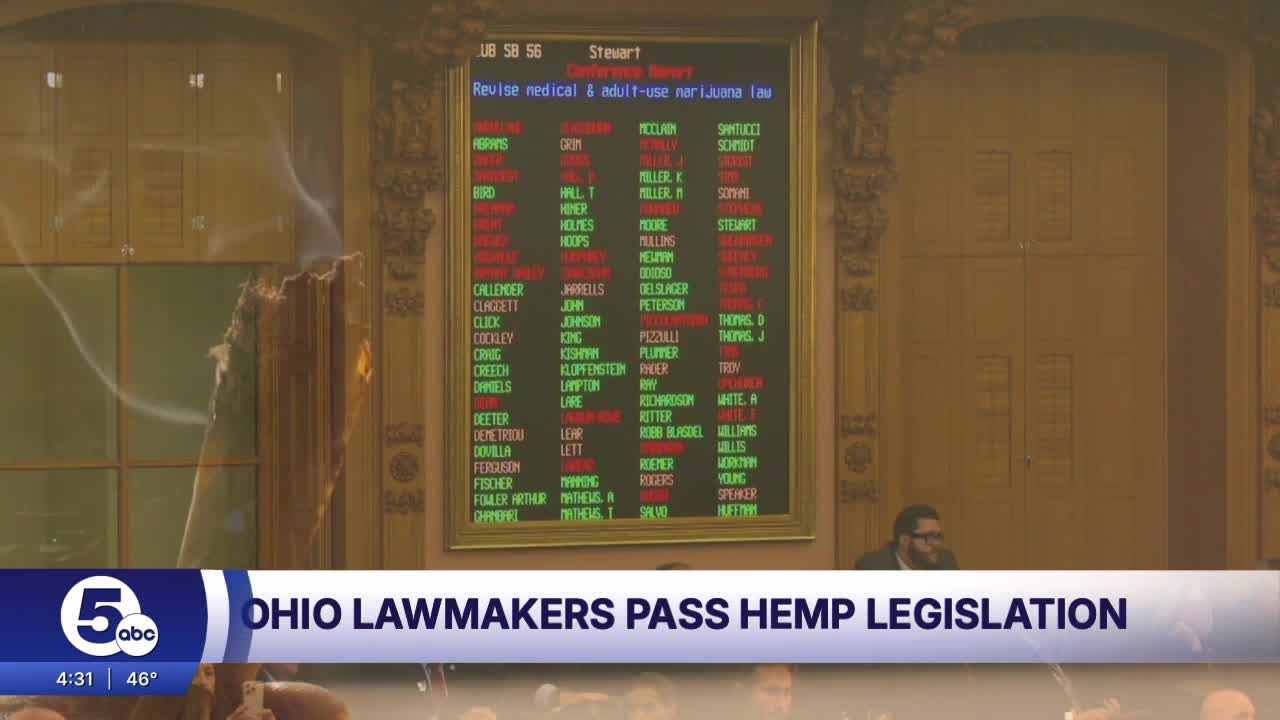COLUMBUS, Ohio — The Ohio House had to weed through differences to narrowly pass legislation banning most "intoxicating" hemp products while protecting marijuana policy from proposed restrictions.
It was an hours-long joint effort — one that took past midnight before Ohio's House finally blazed a new trail for THC policy.
"You have a good settlement when both sides are equally unhappy," said House Finance Chair Brian Stewart (R-Ashville).
In the last session of their year, the House banned the vast majority of "intoxicating" hemp — products with low-level THC that you can buy in gas stations and smoke shops, or at stores like Meredith Farrow's Clean Remedies in Avon.
"Just a complete overreach with a product that has never been known to kill anyone, unlike other drugs and alcohol and prescription medications," Farrow said.
She is urging the Senate not to vote to agree with the House's bill, one that was a deal between the two chambers.
"It's a business I have devoted my entire life savings, my entire life to," Farrow said. "It would most likely put me out of business."
Unhappy faces lined the House chamber as 52 lawmakers voted in favor of the amended Senate Bill 56. State Reps. Tim Barhorst (R-Ft. Loramie), Thaddeus Claggett (R-Licking County), Levi Dean (R-Xenia), Brian Lorenz (R-Powell), Jason Stephens (R-Kitts Hill), D.J. Swearingen (R-Huron) and Michelle Teska (R-Clearcreek Township) joined Ohio Democrats in voting against the bill around 1 a.m. Thursday morning.
RELATED: Ohio lawmakers may compromise on marijuana, hemp policy but no changes to take effect soon
Breweries and stores with liquor licenses will still be able to sell THC drinks until the federal ban on hemp goes into effect next year.
State Rep. Tex Fischer (R-Boardman) was a reluctant yes vote and has pushed for hemp to be revisited if Congress rescinds its ban.
"One of the key things, if not the key thing, to get me from no to yes on this was the commitment that we're gonna come back to the table and figure out a long-term solution to beverages, should the federal government change," Fischer said.
RELATED: Ohio lawmakers set to ban all 'intoxicating' hemp products, including THC drinks
On the marijuana side, cities with dispensaries will finally get a part of the tax revenue from sales. Home growing stays the same at six per person and 12 per household, and THC levels are protected.
But there were additional provisions added that state Rep. Bride Rose Sweeney (D-Westlake) said aren't fair.
"If passed and signed into law, we'll go back on what the people voted on," Sweeney said. "It finds more ways to recriminalize Ohioans for being basic users."
New provisions would make it illegal to have marijuana in your car in some instances, such as putting marijuana in different packaging from that in which it was originally purchased, or traveling with homegrown marijuana. The changes could also jeopardize jobs if someone tests positive for THC.
But state Rep. Jamie Callender (R-Concord) said he will be tackling the criminalization issues.
"We will have some legislation introduced as soon as Friday, potentially, that will start adding to the protections that those folks who are consumers, legal consumers, have," Callender said after the floor vote.
Although he voted yes, he said this was a tough decision for him. He didn't want to be seen as "caving," he said in the interview, emphasizing that for the most part, marijuana was kept significantly more intact than the Senate had originally proposed.
He was able to reduce "unconstitutional" provisions about probable cause for searches if someone is a "known consumer." He got some aspects of the expungement process back in. He made sure that nothing with marijuana products was altered, he said.
He and Fischer worked together to make sure THC beverages were allowed until the federal ban kicks in.
RELATED: 2 Ohio Republicans taking on their own party to protect access to marijuana
Lawmakers told us they were promised they wouldn't need to come back in December if they passed the S.B. 56 amendment as it was. The Senate, which adjourned for the night around 9:30 p.m., is set to come back in December to concur on the deal.
"I think we came to a good compromise going forward," state Sen. Steve Huffman (R-Tipp City) said.
Huffman and Stewart worked closely to negotiate the deal, getting feedback from Callender, Fischer, House Speaker Matt Huffman (R-Lima), state Sen. Shane Wilkin (R-Hillsboro) and Senate President Rob McColley (R-Napoleon).
"I'm not done fighting for recreational use," Callender said. "This was not a home run — but let's call it a single."
Follow WEWS statehouse reporter Morgan Trau on Twitter and Facebook.





